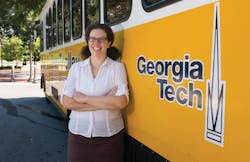Kari Edison Watkins, PE, PhD, is an assistant professor in civil and environmental engineering at Georgia Tech. In her research and teaching, Watkins uses focuses on uses of technology to improve, understand and influence travel mode choice.
Watkin’s path to academia was somewhat unconventional. She worked in consulting for a decade before entering graduate school. After 10 years in the industry and listening to the needs of the traveling public, she saw first-hand how usability and habit form the basis of individual transportation decisions.
Her PhD work at the University of Washington was on measuring the impacts of real-time information on riders and she worked on a smartphone app called OneBusAway in conjunction with the developer, Brian Ferris (now at Google Transit) and project advisor Dr. Alan Borning. Their work found that real-time transit information can increase transit ridership, increase satisfaction with transit performance, improve perception of safety and decrease perceived and actual wait time. Her dissertation won the Council of University Transportation Centers Wootan Award.
OneBusAway was developed under multiple federal grants as an open-source system allowing other transit agencies to adapt the code for their own systems. OneBusAway Puget Sound (Seattle) won multiple local awards and continues to host more than 100,000 unique users per week. The goal of the new Atlanta deployment is to provide a service to area transit riders and to further quantify the impacts of real-time information by conducting a study of OneBusAway users and compare their ridership and perceptions to those of non-users.
After receiving her Ph.D. from the University of Washington, she decided it was time to return to her undergraduate alma mater and the city of Atlanta to help it become a more transit-friendly, bikeable place.
Her research activities at Georgia Tech include developing a OneBusAway Atlanta mobile application to provide real-time arrival information for MARTA services; helped plan TransportationCamp South, which brought together thinkers and doers in the fields of transportation and technology for a day of learning, debating, connecting and creating at Georgia Tech; and helped to develop a smartphone app called CycleAtlanta to track bicycling routes in the greater Atlanta area.
She continues to work on ways to improve traveler information and currently is leading a study for the Transit Cooperative Research Program about the use of Web-based tools to improve transit services (TCRP Project B-43).
“My favorite part of my job is mentoring students who come to me with fantastic ideas about how to make transit work better. Their excitement about innovation and desire to make transportation more efficient and sustainable is contagious. I love to be the facilitator to hone their skills, help them make connections to transit agencies and guide their progress on projects.
“The future of public transportation is very bright. With more millennials living in urban areas and making transit their mode of choice, the industry is being pushed to innovate and solve so many of the long-standing problems. Mobile devices in everyone’s pocket allow us to make information usable and ubiquitous, thus beginning to break down some of barriers to wider transit use.
“I grew up in Detroit, immersed in car culture. When I was 15 I became an exchange student in Germany and the freedom I felt traveling around the country at such a young age was empowering. I no longer needed to wait until I got my license. I had first-class bike paths to get around my village. I had an excellent bus system right outside my door to get into the city. I could take a train to any other city in Europe for a long weekend. It rocked my world. I have worked on making transportation more livable ever since.”



